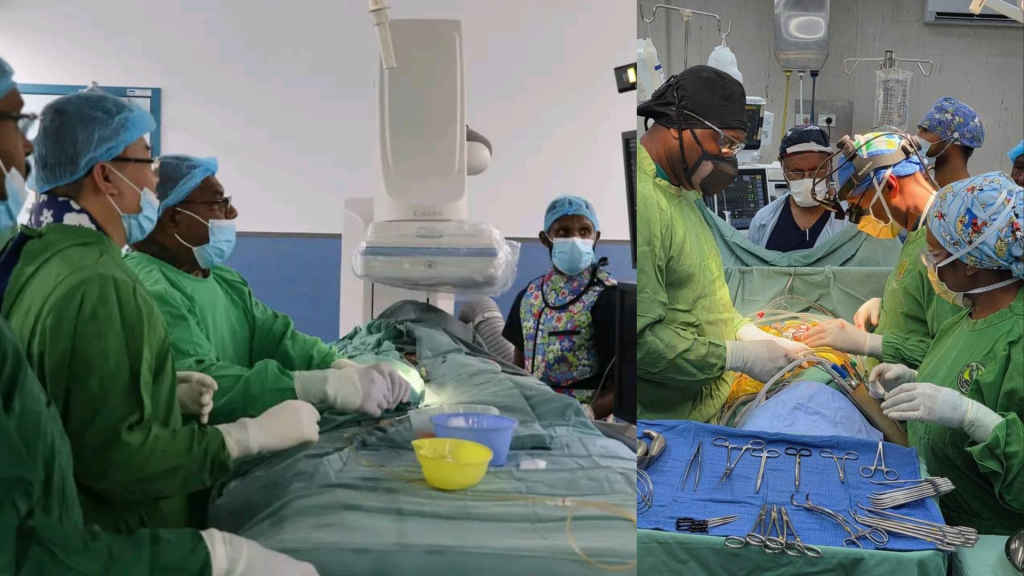In a monumental leap forward for Papua New Guinea’s healthcare system, Port Moresby General Hospital (PMGH) has successfully performed two groundbreaking surgeries—the nation’s first neuro-thrombectomy and its first left heart bypass surgery—ushering in a new era of advanced medical care powered by local expertise and state-of-the-art technology.
These medical milestones were made possible through the support of Kumul Petroleum Holdings Limited (KPHL), which funded and established the Kumul Petroleum National Health Centre (KPNHC) at PMGH.
The facility houses cutting-edge equipment including a catheterization laboratory (Cath Lab), heart-lung machine, and advanced anesthetic systems, crucial in enabling these high-level procedures on home soil.
On Tuesday, 8 July, a team at PMGH led by Dr. Wesong Boko, Director of Intervention and Invasive Cardiology, successfully performed the country’s first neuro-thrombectomy—a procedure to remove a blood clot from the brain of a stroke patient.
The patient was brought to the hospital within an hour of suffering a massive stroke and had lost consciousness with complete paralysis on one side. A CT scan confirmed a large clot in a major cerebral artery. The medical team, including Dr. Pham Nam and Cath Lab staff, performed the delicate clot retrieval procedure.
“As soon as the clot was removed, the patient regained consciousness and muscle movement,” said Dr. Boko. “He walked out of the hospital just four days later. Without this intervention, he would likely have remained paralyzed for life.”
Dr. Boko emphasized the importance of the treatment window, noting that clot retrieval is most effective within 4 to 6 hours of a stroke. The Cath Lab also now enables stenting, even in complex stroke cases involving old infarctions.
Just over a week later, on Wednesday, 16 July, PMGH achieved another historic first with a successful open-heart surgery conducted entirely by a Papua New Guinean team. An 8-year-old boy from Mt Hagen underwent surgery to correct a congenital defect known as coarctation of the aorta.
Specialist Cardiothoracic Surgeon Dr. Noah Tapaua led the operation. During the procedure, the team also identified and treated a second condition—a patent ductus arteriosus (PDA). Due to the location of the defect, surgeons had to temporarily stop blood flow to the lower body, a high-risk step that was safely managed through the use of a left heart bypass—another national first.
“The operation took about three hours and finished late in the evening. The child is now eating and drinking, and doing well post-surgery,” said Dr. Tapaua. “This is a proud moment for our team and a sign of what is possible when local talent is supported with the right tools and training.”
He credited the success to collaboration across multiple departments and acknowledged the longstanding contributions of Operation Heart International (OHI), which has supported heart care in PNG for over 30 years.
PMGH CEO Dr. Paki Molumi hailed the back-to-back successes as a transformative moment in national healthcare.
“Lives are being saved today that would have otherwise been lost or permanently disabled,” he said. “This is not just a milestone for PMGH, but a national turning point.”
Dr. Molumi extended thanks to Kumul Petroleum for its visionary investment in healthcare infrastructure, as well as to Operation Open Heart Foundation and international partners such as Singapore’s KK Women’s and Children’s Hospital and National Heart Centre Singapore for their ongoing support in training local specialists.
KPHL Managing Director Wapu Sonk reiterated that the company’s investment in health is part of its broader national development mission. “We are proud to not only build the energy sector but to invest in the health and future of Papua New Guinea’s people.”
With local medical teams now capable of performing world-class procedures, these two landmark surgeries mark the beginning of a new chapter for healthcare in Papua New Guinea—where patients can receive advanced, life-saving treatment without having to go abroad.

